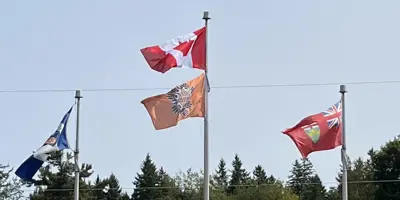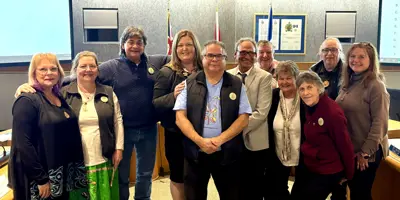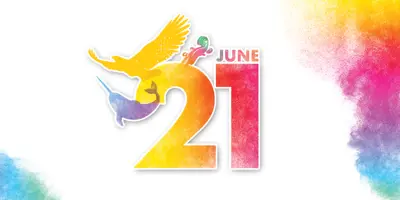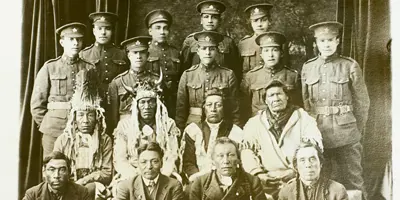Each year, the Municipality raises the Every Child Matters flag at the Municipal Office where the council chambers are. The flag honours the survivors of residential schools and ensures that the inter-generational damage done to Indigenous children are not forgotten.
Truth and Reconciliation
Land Acknowledgement - Council
This sacred land on which Mississippi Mills is now located is the ancestral and unceded territory of the Algonquin Anishinaabe Nation.
Read our Council's land acknowledgement.
Mississippi Mill's journey towards reconciliation
The Municipality strives to build and maintain meaningful partnerships with Indigenous peoples and communities. Mississippi Mills and its Council have taken a number of steps towards learning and reconciliation, with many more steps ahead in this journey.
Below are some initiatives, community groups, and resources, here in Mississippi Mills.

Every Child Matters Flag

Land Acknowledgement Ceremony

National Indigenous History Month

National Indigenous Peoples Day

Indigenous Veterans Day

National Day for Truth and Reconciliation
The Truth and Reconciliation Commission of Canada
Findings and 94 Calls to Action
In 2015, the Truth and Reconciliation Commission of Canada (TRC) released their report on their findings and 94 calls to action after completing extensive documentation of the effects of the residential school system. The findings come from hearings of survivors, their families, community members, former staff of the residential schools and its institutions, and others.
Read the Truth and Reconciliation Commission of Canada: 94 Calls to Action (PDF)
Mississippi Mills is committed to carrying out TRC Call to Actions relating to municipalities:
Local Community Groups
Rebuilding trust between Indigenous and non-Indigenous peoples is an ongoing process, and must include everyone in our communities. Below are some community groups in our area committed to truth and reconciliation:
Resources
- Indigenous Canada course - University of Alberta
- Free, 12 weeks long, online
- Understanding Indigenous Perspectives - University of Toronto
- Six free learning modules and resources for teaching
- The Ten Guiding Principles of Truth and Reconciliation - Department of Justice, Government of Canada
- Findings and 94 Calls to Action - Truth and Reconciliation Commission of Canada - University of Manitoba
- Hope for Wellness
- Hope for Wellness provides immediate, culturally competent crisis intervention and support for all Indigenous Peoples. It is available 24 hours a day, 7 days a week.
- 1-855-242-3310
- Indian Residential Schools Resolution Health Support Program
- For former residential school students, there is a National Crisis Line if you need to talk or require emotional and crisis referral services. It is available 24 hours a day, 7 days a week.
- 1-866-925-4419





